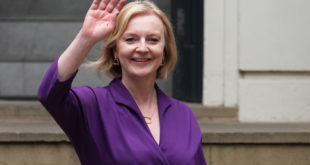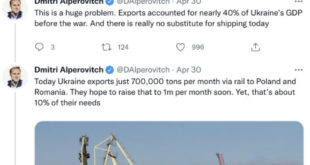Dear friends, I said I wouldn't post any more on this site. But Elon Musk doesn't like me posting Substack links on Twitter. And Substack itself is a mess. The home page looks amateurish, and new posts don't even appear on it until they've amassed enough views to push down previous posts. It's an absurd way of organising a site. So I have decided in future to post links to my Substack posts here. Hopefully this will mean you can find them more easily, both on Google and Twitter. Some of my...
Read More »Too Poor for War
Nov 8, 2022 ROBERT SKIDELSKY and PHILIP PILKINGTON Decades of deindustrialization have hollowed out the UK economy and made it woefully ill-prepared for wartime disruptions. As the financial speculators who funded its current-account deficits turn against the pound, policymakers should consider Keynesian taxes and increasing public investment. LONDON – A wartime economy is inherently a shortage economy: because the government needs to direct resources toward manufacturing guns, less...
Read More »If we elected more women would there be less war? Yes but not for the reasons you think
Liz Truss is the United Kingdom's new prime minister—that brings the number of female leaders in the G20 to two. She enters world politics at a tense moment: Russian President Vladimir Putin's invasion of Ukraine looks unlikely to end anytime soon, and tensions in the Taiwan Strait are greater than ever. The risk of a great power war between the West and Russia or China seems greater than any point in 30 years.Maybe what we need is more women in charge, and fewer macho men. Surely that would...
Read More »How to cut short the long slog in Ukraine
James Stavridis, the former NATO supreme allied commander for Europe, recently predicted that the Russia-Ukraine conflict would end this year. Some experts, such as Stavridis, expect a stalemate and frozen conflict. Others hope for negotiations to begin. After all, this is what usually happens. War is brutally expensive and exhausting, so most conflicts are brief. Over the last century, the average war was just 100 days long. Unfortunately, some wars last because sustaining the...
Read More »Two articles on Russia and Ukraine
Between 1998 and 2003, Ksenia Yudaeva and Konstantin Sonin were colleagues, first at the Russian-European Center for Economic Policy and then at the Center for Economic and Financial Research and Development. After Russia invaded Ukraine in February 2022, Sonin (now a professor at the University of Chicago) reached out to Yudaeva (who today serves as the first deputy governor of the Central Bank). Fearing data insecurity on Facebook and Telegram, she asked him to install Signal....
Read More »The economic and social consequences of the war on Europe and Italy
Sergio Cesaratto – The economic and social consequences of the war on Europe and Italy Brave New Europe, May 12, 2022 Political realism offers useful keys to interpreting the international political economy, which has never been more endangered than today by the military escalation in Ukraine. The EU and Italy risk to be the pots and pans in the unprecedented economic crisis looming ahead. Sergio Cesaratto teaches European monetary and fiscal...
Read More »The economic and social consequences of the war on Europe and Italy
By Sergio CesarattoWith a certain pride I remember having already mentioned for some years, within the framework of my economic courses, political realism in international relations and International Political Economy. I did so in academic contexts in which an uncritical Europeanism based on liberal thinking prevailed (and prevails) according to which the world is divided into good and bad. The book, which I suggested for reading to my students (Sorensen 2005), published in Italian by...
Read More »How much longer can Ukraine and Russia continue to fight, and what are the prospects for escalation versus stalemate?
Dmitri Alperovitch asks how Ukraine will pay for its war if it cannot export in this thread: Let’s talk about the state of the war and one of the most underreported yet crucially important issues: Russian blockade of Ukrainian ports and resulting strangulation of the country’s economy ? — Dmitri Alperovitch (@DAlperovitch) April 30, 2022 The full thread is worth reading but here is the key part: Last week I pointed to Yuriy Gorodnichenko‘s estimate that Ukraine needed about 40-50% of...
Read More »Every war has both psychological and strategic roots, and we don’t need to choose just one explanation
That is my op-ed in today’s WSJ. You don’t get to pick your headlines, and I am guessing “The Strategic Logic of Russia’s War on Ukraine” will get misinterpreted somewhat.My view: this is a war driven by Mr. Putin’s psychology, but like all psychological roots of war, they are only decisive when the strategic bargaining space is so narrow. Some will see this as a rationalist take on war, but this is only partly true (and it’s a term I loathe). That’s because it’s not an either/or—strategic...
Read More »Sleepwalking into war
In a broad-ranging discussion the other day about the path of political and economic policy over the last decade, I found myself returning again and again to events in 2014. Events that were apparently unrelated: Bulgaria's banking crisis, Moldova's banking fraud, the collapse of Banco Espirito Santo, the election of Syriza in Greece, the first Scottish independence referendum, UKIP's success in two Westminster by-elections as well as local and European elections. And in Ukraine, the...
Read More » Heterodox
Heterodox


